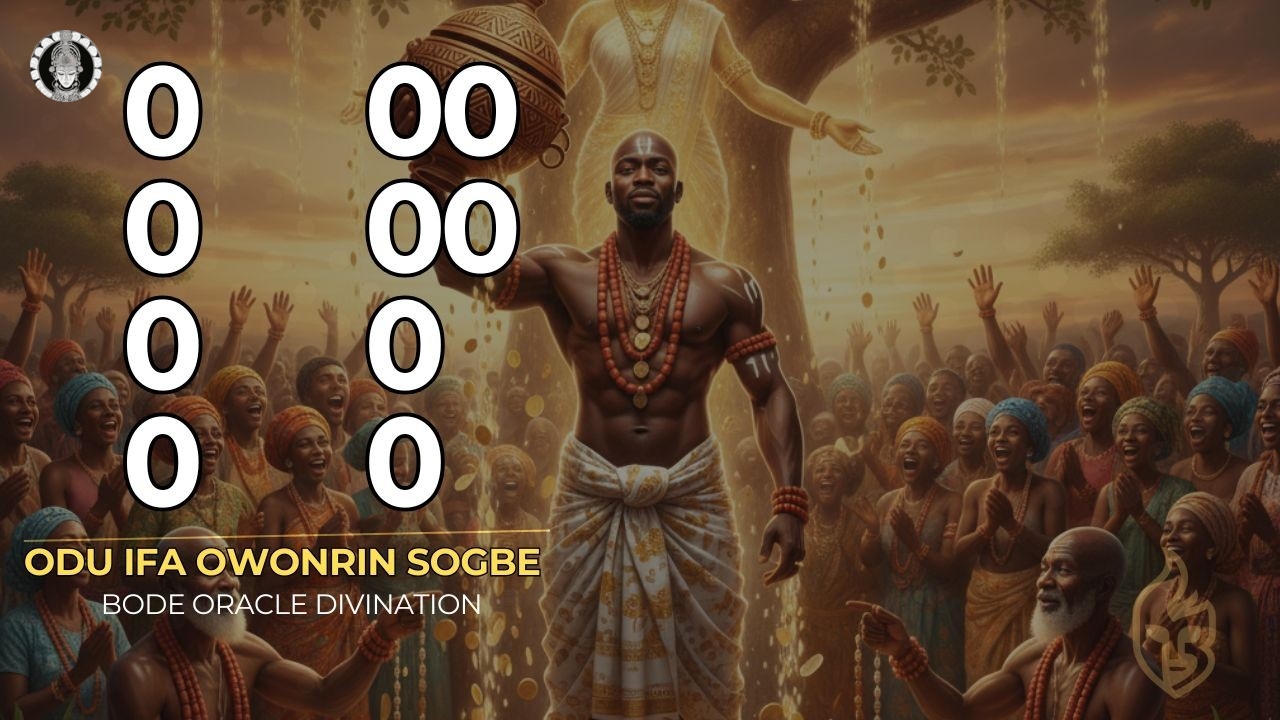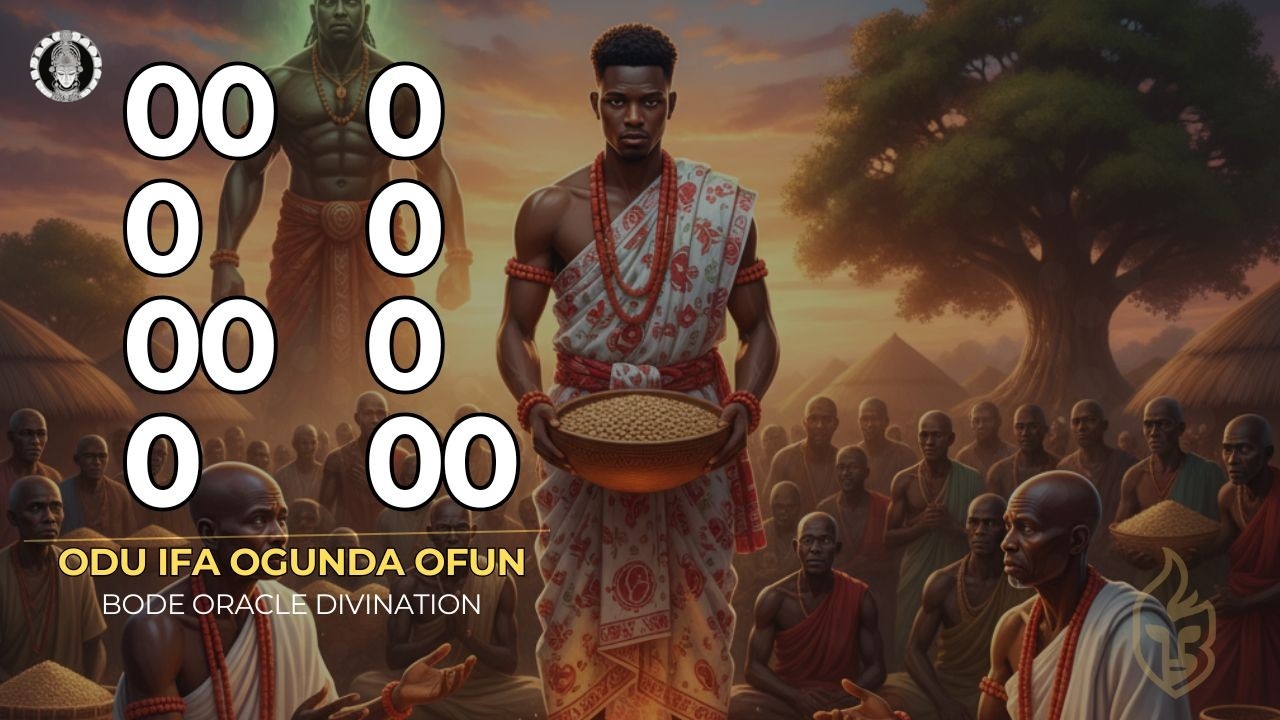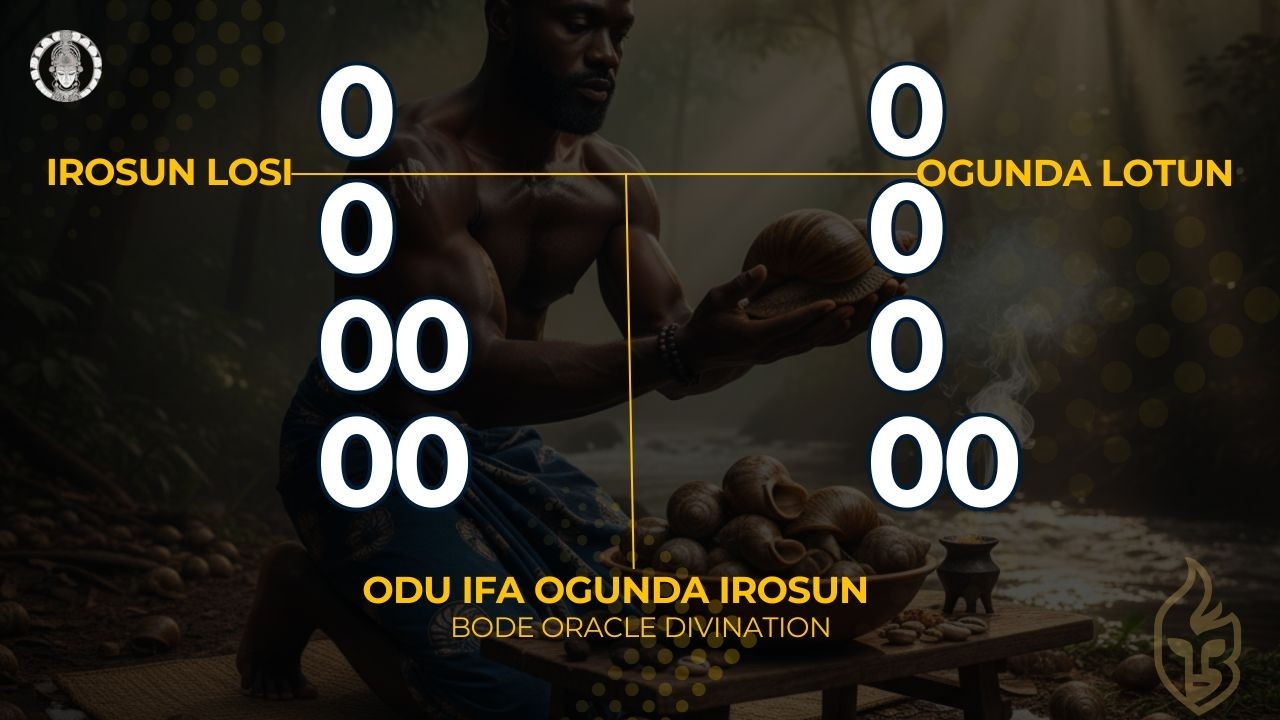Introduction to Odu Ifa Ogunda Irosun
Odu Ifa Ogunda Irosun represents one of the 256 sacred divination signs in the Ifa corpus, combining the strength and warrior energy of Ogunda with the gentle, flowing nature of Irosun. This powerful Odu carries profound messages about achieving prosperity without losing one's good reputation, overcoming business struggles despite opposition, understanding the natural cycles of relationships, and finding the path to complete tranquility through proper spiritual practice.
The divinations within Ogunda Irosun address fundamental aspects of human experience: the desire for wealth that doesn't compromise integrity, the struggle to succeed when others doubt you, the pain of separation and the hope of reunion, and the search for peace amidst life's challenges. Each story serves as both practical guidance and spiritual instruction, teaching us how to navigate commerce, relationships, and personal development with wisdom and spiritual awareness. For comprehensive understanding of the 16 Odu Ifa and their meanings, explore our detailed guide.
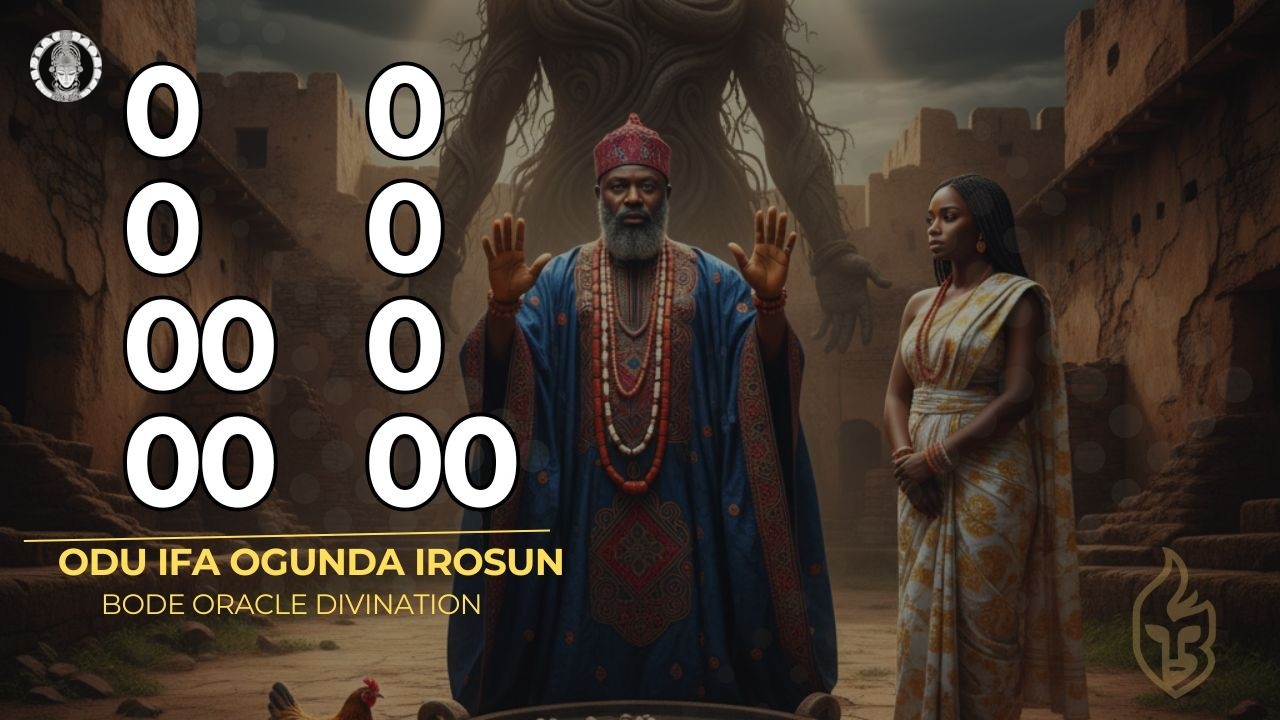
Ifa Divination for Alari and Ododo: Prosperity Without Losing Fame
Understanding the Balance of Success and Reputation
This divination from Ogunda Irosun addresses one of the most delicate challenges in life—achieving material success while maintaining one's good name and reputation. Alari represents traditional cloth or attire, symbolizing cultural identity and social standing, while Ododo represents the flower, symbolizing beauty, gentleness, and natural growth. Together, they came to earth seeking prosperity that would not damage their inherent beauty and reputation.
The divination specifically speaks to those who fear that pursuing wealth might compromise their integrity or social standing. It reveals that through proper sacrifice, one can achieve financial success while simultaneously preserving—and even enhancing—their reputation and honor in the community.
The Importance of Joint Sacrifice
What makes this divination particularly significant is Ifa's instruction that the person must offer sacrifice together with their mother's child (a sibling or close relative from the same maternal line). This reflects the deep Yoruba understanding that family members are spiritually interconnected—one person's blessing or struggle affects their siblings, and collective spiritual work strengthens the entire family unit.
The divination also addresses friendship and partnership, revealing that when two people who genuinely love each other or who work together are experiencing difficulties, they must join in offering sacrifice. This joint spiritual effort creates an unbreakable bond that no external force can sever.
The Sacred Verse
Ogunda roro
Irosun naa roro
Adifafun alari oun ododo
Won raye alainiti
Ebo won ni o se o
won si gbebo nibe won rubo
Ruru ebo
Eru atukesu
E wa bani jebutu ire
Jebutu ire labani lese oba risa.
English Translation
Ogunda roro
Irosun also roro
Ifa divination was cast for Alari (traditional cloth) and for Ododo (the flower),
When they were going to earth without losing their fame.
They were asked to offer a sacrifice,
And they complied.
They offered the sacrifice completely.
Complete offering.
Come and rejoice with me for the blessing of goodness.
It is in the realm of goodness that we find someone at the feet of the great deity.
The Meaning of "Roro"
The repetition of "roro" in the opening lines carries significant meaning. In Yoruba, this term suggests something that is well-spread, abundant, or flowing freely. It describes how both Ogunda and Irosun energies are fully manifest and flowing—suggesting that when these two forces combine properly through sacrifice, blessings flow abundantly and naturally, like water spreading across the land or cloth unfurling to its full beauty.
Prescribed Offerings (Ebo)
For those who receive this divination, Ifa prescribes specific offerings to ensure prosperity while maintaining reputation. The offerings include pigeons (eyele), which represent peace and gentle ascension to wealth; a rooster (akuko adie), symbolizing authority and the announcement of one's success; a hen (agbebo adie), representing nurturing and the care that must accompany prosperity; and money (opolopo owo), which facilitates the practical aspects of business and maintains the social obligations that come with wealth.
Practical Application for Modern Times
In contemporary society, this Odu speaks to professionals, business people, and anyone seeking to advance financially without compromising their ethics or reputation. It addresses the modern concern about "selling out" or losing one's authentic self in pursuit of success. Ifa teaches that integrity and prosperity are not opposites but can be achieved simultaneously through proper spiritual practice and ethical conduct. Learn more about Ogunda Irosun divination practices on our dedicated page.
Ifa Divination for Orunmila: The Ultimate Path to Peace and Victory
The Quest for Complete Tranquility
This divination from Ogunda Irosun presents one of the most profound teachings in the Ifa corpus—Orunmila's own quest to understand what offering truly brings complete peace, victory, and spiritual satisfaction. Unlike typical divinations where Orunmila provides guidance to others, this verse shows Orunmila himself seeking the ultimate answer to what sacrifice brings perfect results.
The divination addresses those who have been struggling for a long time to find peace in their lives. Despite trying various approaches and making different sacrifices, true tranquility remains elusive. Ifa reveals that the answer lies not in dramatic or expensive offerings, but in something humble yet profound—the snail.
The Sacred Verse
Ki lefi n sebo ogunda rosun ti n fi n fin
Won le ku ni abajo
Ti n firi kurukuru
Ki le fin seboogunda rosun
Ti n fi n fi won ni eja ni won
Abajo tin firi jaaja
Ki le fin seboogunda rosun
Ti n fi fin won ni eye ni
Won ni abajo tin fi riyeye
Kile fin seboogunda rosun
Tin fi fin won ni eran ni won ni
Abajo ti n fi n ri ranhun ranhun
Nje, orunmila mojewo
Obunda soromi mopo elejelu
Omo erin tin fan kikan
Omo erin tin fan gburugbaralalo
Won ni kin won fi sebo ogunda ti fi n fin
Orunmila ni igbin ni
Nje igbin mi de molero akoko
Pero simi lori pero simi lorun
English Translation
What do you offer as sacrifice for Ogunda Irosun,
That has made you victorious?
They said it was rat, I said no wonder
That blessings are coming your way.
What do you offer as sacrifice for Ogunda Irosun,
That has made you victorious?
They said it was fish, and I said no wonder.
What do you offer as sacrifice for Ogunda Irosun?
They said it was bird, I said no wonder that things are improving.
What do you offer as sacrifice for Ogunda Irosun,
That has made you victorious?
They said it was meat/goat, they said no wonder
That things are improving day by day.
Therefore, Orunmila, I confess to you.
Blessings must arrive.
The child of the elephant who blows his sounds,
The child of the elephant who sounds mysteriously.
They asked what you offer as sacrifice for Ogunda Irosun,
That is coming out victorious?
Orunmila said it is the snail.
Therefore, my snail has arrived, molero akoko.
Bring me complete peace.
Understanding the Progression of Offerings
The verse presents a beautiful progression of increasingly significant offerings—rat, fish, bird, and goat—each bringing its own level of blessing and improvement. The repetition of "no wonder" (abajo) after each offering acknowledges that each sacrifice has value and brings results. However, when asked what brings ultimate victory and complete peace, Orunmila reveals the answer: igbin (snail).
The Profound Symbolism of the Snail
The snail holds deep symbolic meaning in Yoruba spirituality. It moves slowly and deliberately, carrying its home on its back, representing self-sufficiency and patience. The snail's spiral shell represents the sacred geometry of creation and the cyclical nature of existence. Its ability to seal itself within its shell for protection symbolizes internal peace and self-contained completeness. Most significantly, the snail leaves a cooling, soothing trail wherever it goes—representing the peace and tranquility it brings to all situations. For deeper understanding of Yoruba spiritual philosophy and divination systems, consult UNESCO documentation on Ifa of the Yoruba People.
The Elephant's Mysterious Sound
The reference to "the child of the elephant who sounds mysteriously" (omo erin tin fan gburugbaralalo) carries its own teaching. The elephant's low-frequency calls can travel for miles and communicate complex messages that humans cannot fully perceive. This represents the idea that true spiritual power often works in ways beyond our immediate perception—subtly, profoundly, and mysteriously effective.
Molero Akoko: Complete and Absolute Peace
The phrase "molero akoko" translates to complete, absolute, or total peace. This is not merely the absence of conflict, but a profound state of spiritual tranquility where one's inner being, relationships, business, and destiny are all aligned and flowing harmoniously. This is the ultimate goal of spiritual practice in Ifa—not just success or wealth, but peace that encompasses all aspects of existence.
Prescribed Offerings (Ebo)
For those seeking complete peace and resolution to long-standing struggles, Ifa prescribes many snails (opolopo igbin) and money (opolopo owo). The abundance of snails reflects the understanding that profound transformation requires substantial spiritual investment. The snails must be prepared properly with prayers and incantations to activate their spiritual properties.
Practical Application for Modern Times
This divination speaks powerfully to our modern age of anxiety, stress, and constant striving. It teaches that peace doesn't come from dramatic gestures or expensive solutions, but from humble, consistent spiritual practice symbolized by the snail. For those experiencing chronic stress, business struggles, or spiritual unrest, this Odu offers hope that complete tranquility is achievable through proper sacrifice and patience.
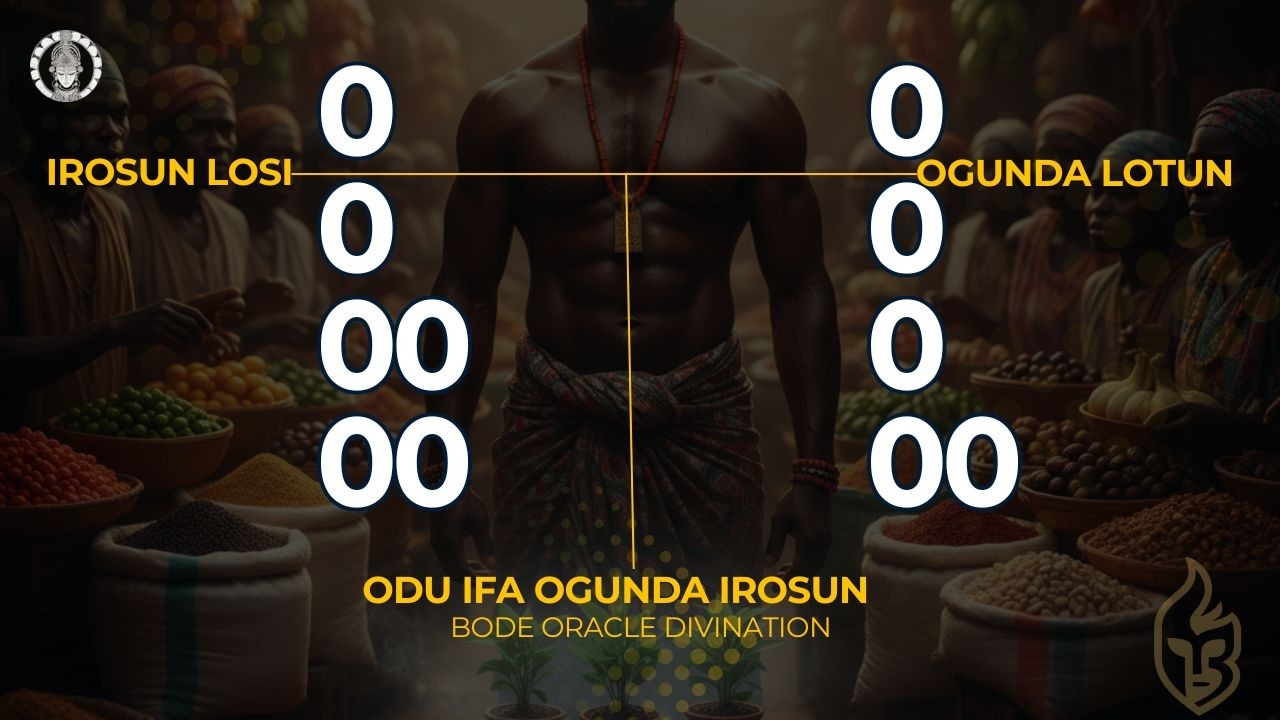
Ifa Divination for the Land: Understanding the Cycles of Departure and Return
The Natural Law of Cycles
This divination from Ogunda Irosun presents a profound teaching about the cyclical nature of relationships, particularly focusing on romantic partnerships. Using the Earth (Ile) as the protagonist—who serves as the husband to all things—Ifa reveals a universal spiritual principle: what rises must fall, what leaves must return, and what departs will come back if it is spiritually ordained.
The divination specifically addresses the painful experience of having someone important leave one's life, particularly a romantic partner. Rather than responding with desperation or anger, Ifa teaches that proper spiritual intervention can create conditions that make the departed person unable to find peace elsewhere, naturally drawing them back to where they belong.
The Sacred Verse
Ogunda rosun
Gbaran gasa
Adifafun ile tii se oko lala
Ebo won ni o se
O si gbebo nibe orubo
Nje, lala toroke
Ile ni o n bo.
English Translation
Ogunda Irosun
Gbaran gasa
Ifa divination was cast for the Land, who serves as husband to everything.
He was asked to offer a sacrifice,
And he complied.
Therefore, whatever goes up
Will surely descend later.
The Land as Universal Husband
The choice of Ile (Land/Earth) as the protagonist carries profound meaning. The Earth receives everything—all things come from it and return to it. Seeds are planted in it, plants grow from it, animals and humans walk upon it, and ultimately all return to it. As "husband to everything" (oko lala), the Land represents stability, patience, and the certainty of return. This teaches that those who possess these qualities—groundedness, patience, and spiritual stability—will naturally attract back what belongs to them.
Gbaran Gasa: The Sound of Certainty
The phrase "Gbaran gasa" is onomatopoetic, representing a sound of something heavy falling or settling firmly into place. It suggests finality, certainty, and the inevitable nature of what the verse teaches. Just as objects thrown into the air must eventually fall back to earth by natural law, so too must spiritually-bonded relationships eventually reunite when proper spiritual work is done.
The Spiritual Mechanics of Return
Ifa teaches that when someone leaves a relationship that is spiritually ordained, they will not find peace (kooni rolorun) wherever they go. This is not a curse but a natural spiritual consequence—when someone leaves their destined place, they experience internal unrest that eventually drives them back. The sacrifice prescribed creates and amplifies this spiritual dynamic, ensuring that the departed person's attempts to settle elsewhere prove unsuccessful.
Prescribed Offerings (Ebo)
For relationship restoration and ensuring the return of departed loved ones, Ifa prescribes a rooster (akuko adie), which announces the dawn and symbolizes the return of light and hope; a hen (agbebo adie), representing nurturing and the recreation of domestic harmony; a pigeon (eyele), symbolizing peace and gentle reunion; and money (opolopo owo), which facilitates the practical aspects of reconciliation and demonstrates serious spiritual commitment.
Important Spiritual and Ethical Considerations
It is crucial to understand that this divination applies specifically to relationships that are spiritually ordained—those that are meant to be according to destiny. Ifa does not support using spiritual power to manipulate or force relationships that are not meant to exist. The teaching is about restoration of what belongs together, not coercion of what should remain apart. A qualified Babalawo can determine through divination whether a relationship is spiritually ordained and whether this particular ebo is appropriate. Explore more wisdom from our collection of Ifa teachings.
Ifa Divination for Olomo: Victory in Business Despite Opposition
The Challenge of Skeptical Neighbors
This divination from Ogunda Irosun addresses a common and deeply frustrating experience in business and entrepreneurship—working diligently but not seeing profits, while neighbors, competitors, or observers openly predict your failure. Olomo represents anyone engaged in commerce or business who faces both practical struggles and the spiritual weight of others' negative expectations and mockery.
The divination reveals a crucial truth: when people around you are saying you will not succeed, their words carry spiritual weight that can actually hinder your progress. This is not superstition but recognition that collective negative speech creates spiritual obstacles that must be addressed through proper sacrifice.
The Sacred Verse
Ogunda leji irosun lote
Adifafun olomo
Ti o sowo sowo ti ara ilere nikoni pe
Ebo won ni o se
O si gbebo nibe orubo
Nje apepe loni ki ise temi o pe mi
Ejinrin loni ki ire temi o mojinnan
Ito loni kiire temi o to mi lowo.
English Translation
Ogunda leji irosun lote
Ifa divination was cast for Olomo,
Who was engaged in business,
About whom his neighbors said he would not profit.
He was asked to offer a sacrifice,
And he complied.
It is quickly that says my work should not be far from me.
It is ejinrin that says my blessings should not be distant.
It is ito that says goodness should reach my hands.
The Spiritual Dynamics of Business Opposition
This divination reveals an important spiritual principle in Yoruba cosmology: words carry power, especially when spoken by multiple people or by those in close proximity (neighbors). When Olomo's neighbors declared he would not profit, their collective speech created a spiritual barrier between him and his blessings. This is not mere psychological discouragement but actual spiritual interference that requires ritual intervention to overcome.
The verse uses three powerful affirmations to counter the negative predictions: "apepe" (quickly/speedily), "ejinrin" (a plant associated with rapid growth), and "ito" (genuineness/authenticity). Each represents a different aspect of blessing—speed of arrival, distance of blessings, and the quality of goodness reaching one's hands. Together, they create a comprehensive spiritual counter-force against the neighbors' negative declarations.
The Importance of Workplace Sacrifice
Significantly, Ifa instructs that the sacrifice must be offered specifically at the place of work (enu ise). This is crucial because the spiritual obstruction exists at the location where the business activity occurs. By performing the sacrifice at the actual business site, the spiritual intervention directly addresses and neutralizes the negative energy in that specific space.
Understanding "Awon Araile Re Won Si Fi Se Yeye"
The phrase describing the neighbors' behavior—"awon araile re won si fi se yeye"—translates literally as "his neighbors were mocking him" or "treating him with disdain." This reveals that the opposition wasn't just private doubt but public mockery, which compounds the spiritual damage. Public ridicule creates communal consensus against success, which in Yoruba spirituality is a powerful force that must be ritually broken.
Prescribed Offerings (Ebo)
For business success despite opposition, Ifa prescribes a rooster (akuko adie), which announces victory and breakthrough; pigeons (eyele), representing peace in business dealings and harmonious transactions; a hen (agbebo adie), symbolizing steady growth and the nurturing of the business; and money (opolopo owo), which both facilitates the sacrifice and represents the prosperity being invoked.
Practical Application for Modern Entrepreneurs
This Odu speaks directly to modern business owners, freelancers, and entrepreneurs who face skepticism from family, friends, or competitors. It validates the real spiritual impact of negative expectations while providing a solution. In contemporary practice, the "place of work" could be a physical storefront, an office, a workshop, or even the corner of a home where business activities are conducted. For scholarly perspectives on Ifa as a knowledge system, refer to research on algebraic characterization of Ifa divination codes.
The Promise of Proximity to Blessings
The three affirmations in the verse—work not being far, blessings not being distant, and goodness reaching one's hands—emphasize proximity and accessibility. This counters the frustrating experience of seeing success "out there" but never quite reaching it. After proper sacrifice, blessings don't remain tantalizingly close but unreachable; they actually arrive and manifest tangibly ("to mi lowo"—reach my hands).
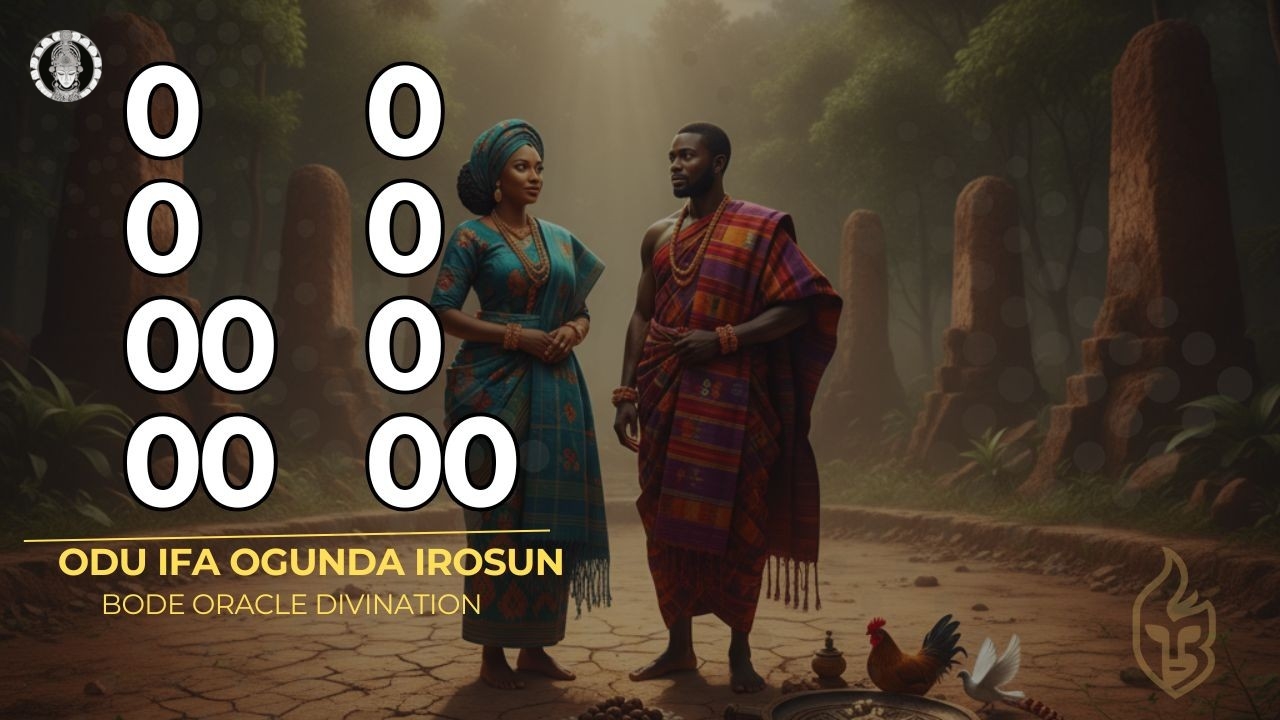
Akose and Spiritual Preparations of Ogunda Irosun
Understanding Akose in Ifa Practice
Akose refers to spiritual preparations or medicinal formulations that combine herbal, animal, and mineral substances with spiritual invocations to produce specific results. Unlike ebo (sacrifices offered to spiritual forces), akose are preparations applied directly to the person's body or consumed. The akose of Ogunda Irosun are particularly powerful for attracting wealth and defeating enemies who oppose one's progress.
Akose Awure Ola: Preparation for Wealth and Honor
This akose is specifically designed to attract prosperity, honor, and good fortune (ola) into one's life. The preparation involves combining spiritually potent elements in a prescribed manner that aligns one's spiritual frequency with abundance and success.
Ingredients and Preparation
The akose requires akoko herbs, iyere (a specific medicinal plant), and sixteen snails (igbin merindinlogun). These ingredients are prepared together with palm oil (epo) and salt (iyo), cooked until fully done, and then consumed by the person seeking blessings.
Spiritual Significance of the Ingredients
Akoko herbs represent strength, support, and the ability to stand firm despite opposition. The plant is known for its resilience and medicinal properties. Iyere brings cooling and attractive properties, drawing blessings while maintaining peace. The sixteen snails represent completeness in Yoruba numerology—sixteen is the number of primary Odu in Ifa, representing wholeness and spiritual totality. Palm oil (epo pupa) is sacred to many Orisa and represents life force, vitality, and spiritual power. Salt purifies and preserves, ensuring the blessings attracted remain stable.
The Power of Sixteen Snails
The use of exactly sixteen snails is not arbitrary but deeply significant. As mentioned earlier, the snail represents peace, patience, self-sufficiency, and the ability to protect oneself while moving forward. Using sixteen snails invokes the complete power of all sixteen primary Odu, creating a comprehensive spiritual effect that addresses all dimensions of prosperity and honor.
Proper Preparation Method
The akoko herbs are ground together with iyere to create a paste or powder. The sixteen snails are thoroughly cleaned and cooked with this herbal mixture, along with palm oil and salt. The cooking process itself is spiritually significant—heat transforms the physical ingredients into medicine while prayers and incantations transform them spiritually. Once fully cooked (tio ba ti jinan—when completely done), the preparation should be consumed over time, typically in the morning.
Akose Isegun Ota: Preparation for Victory Over Enemies
This akose is designed specifically to defeat adversaries, overcome opposition, and ensure victory in conflicts or competitive situations. It works by spiritually empowering the person to overcome any force working against their progress.
Ingredients and Preparation
The akose requires seven pieces of red pepper (ata pupa meje) and seven pieces of alupaida herbs (ewe alupaida meje). These are ground together and used to make incisions (singbere) in the middle of the head (ogun ole eyo si arin ori).
Spiritual Significance of the Ingredients
Red pepper (ata pupa) is one of the most spiritually powerful substances in Yoruba practice. It represents aggression against enemies, the heat that burns away opposition, and the power to cause discomfort to those who wish harm. Alupaida is a plant known for its protective and victory-giving properties in Yoruba herbalism. The combination creates a formidable spiritual defense and offense against adversaries.
The Significance of Seven
The use of seven pieces of each ingredient is spiritually significant. Seven is associated with completeness, perfection, and spiritual power in Yoruba cosmology. Using seven of each ingredient ensures comprehensive coverage and complete victory over all categories of enemies—spiritual, physical, seen, and unseen.
Placement in the Middle of the Head
Making incisions in the middle of the head (arin ori) is highly significant. The ori (head) is considered the seat of one's personal destiny in Yoruba spirituality. The top center of the head is where one's inner spiritual self connects with divine forces. By placing this powerful preparation at this location, the person's very destiny is fortified against enemy attacks, ensuring that opposition cannot derail their ordained path.
Important Considerations for Akose Use
Both akose preparations should only be used under the guidance of a qualified Babalawo who can properly invoke the necessary incantations (ofo ase) and ensure correct preparation. The spiritual power of akose comes not merely from the physical ingredients but from the prayers, invocations, and spiritual knowledge that accompany their preparation and application. A Babalawo will also determine through divination whether a particular akose is appropriate for an individual's specific situation and spiritual state. For understanding the artistic and cultural dimensions of Ifa practice, explore UNESCO recognition of the Ifa divination system.
Modern Adaptations and Availability
In contemporary practice, some ingredients may need substitution based on availability in different geographical locations. A knowledgeable Babalawo can identify spiritually equivalent substitutes while maintaining the essential properties of the preparation. The core principle remains: combining substances that carry specific spiritual properties while invoking the appropriate spiritual forces through prayer and ritual.
Additional Resources
Internal Links
- Complete Guide to Ogunda Irosun - Detailed information, taboos, and practices
- Bode.ng Blog - Extensive collection of Ifa and Yoruba spirituality articles
- Complete Odu Ifa Directory
- Bode.ng - Home
External Resources
- African Traditional Religions: Ifa Divination - Duquesne University
- Ifa of the Yoruba People of Nigeria - UNESCO
- Algebraic Characterization of Ifa Main Divination Codes
- UNESCO Recognition of Ifa Divination System
- Ifa Divination System - Wikipedia
Connect With Us on Social Media
- BODE Oracle on TikTok
- BODE Oracle on YouTube
- BODE Oracle on Facebook
- BODE Oracle on X (Twitter)
- BODE Oracle on Pinterest
Visit Bode.ng to explore more divination teachings, participate in quizzes and polls, and connect with our community of practitioners and learners. Register today to access exclusive content and personalized guidance on your spiritual journey.
Frequently Asked Questions And Answers About Odu Ifa Ogunda Irosun
Find answers to common questions about this sacred Odu Ifa and its divination teachings
Ogunda Irosun is one of the 256 sacred Odu (divination signs) in the Ifa corpus. It carries powerful messages about achieving prosperity without losing reputation, overcoming business struggles, restoring relationships, and finding peace through proper spiritual practice. This Odu teaches that through appropriate sacrifice and patience, one can achieve success that brings both material wealth and spiritual tranquility.
The divination of Olomo in Ogunda Irosun specifically addresses business struggles where neighbors or competitors doubt your success. When prescribed offerings (rooster, pigeons, hen, and money) are made at the place of work, Ifa promises that profitability will come despite opposition. The Odu emphasizes that blessings should not be far away and that goodness will manifest in one's endeavors.
The divination for the Land teaches that what goes up must come down—when a woman leaves, she will return if the relationship is spiritually ordained. Ifa prescribes offerings of rooster, hen, pigeon, and money to ensure that the departed person finds no comfort elsewhere and returns. This demonstrates the cyclical nature of relationships and the power of proper sacrifice to restore what was lost.
In Orunmila's divination within Ogunda Irosun, the snail (igbin) represents the ultimate offering that brings complete peace and tranquility. When Orunmila was asked what sacrifice brings victory, he answered that it is the snail. The Akose Awure Ola uses sixteen snails cooked with akoko herbs, iyere, palm oil, and salt—this preparation attracts wealth and honor while bringing profound peace to one's life.
The divination of Alari and Ododo emphasizes that a person must offer sacrifice together with their mother's child (sibling) so that life will be good and propitious for both. This reflects the Yoruba understanding that family bonds are spiritually interconnected—one person's blessing or curse affects their siblings. When friends or siblings who love each other offer sacrifice together, their unity is strengthened and cannot be broken.
"Roro" suggests something that is well-spread, abundant, or flowing freely. It describes how both Ogunda and Irosun energies are fully manifest and flowing. When these two forces combine properly through sacrifice, blessings flow abundantly and naturally, like water spreading across the land or cloth unfurling to its full beauty.
Akose Awure Ola is a spiritual preparation for attracting wealth and honor. It combines akoko herbs, iyere plant, and sixteen snails cooked together with palm oil and salt until fully done. Once prepared, it is consumed to align one's spiritual frequency with abundance. The sixteen snails represent completeness, invoking the power of all sixteen primary Odu for comprehensive prosperity.
Akose Isegun Ota is a preparation for victory over enemies and opposition. It combines seven pieces of red pepper and seven pieces of alupaida herbs, ground together and used to make incisions in the middle of the head. The red pepper represents aggressive power against adversaries, while alupaida provides protection and victory. Placing it on the crown fortifies one's destiny against enemy attacks.
The divination of Olomo instructs that sacrifice must be offered at the place of work because spiritual obstruction exists at the location where business activity occurs. By performing the sacrifice at the actual business site, the spiritual intervention directly addresses and neutralizes negative energy in that specific space, removing barriers to profitability and success.
"Molero akoko" translates to complete, absolute, or total peace. This is not merely the absence of conflict but a profound state of spiritual tranquility where one's inner being, relationships, business, and destiny are all aligned and flowing harmoniously. This represents the ultimate goal of spiritual practice in Ifa—comprehensive peace encompassing all aspects of existence.
All sacrifices (ebo) and spiritual preparations (akose) in Ogunda Irosun should be performed under the guidance of a qualified Babalawo (Ifa priest). The priest ensures proper procedures, invokes necessary incantations, and adapts traditional practices to modern contexts when needed. The spiritual power comes not just from physical materials but from prayers, invocations, and spiritual knowledge that accompany preparation and offering.
You can explore comprehensive information about Ogunda Irosun through several resources:
- Complete Guide to Ogunda Irosun - Detailed taboos and practices
- Bode.ng Blog - Extensive articles on Ifa spirituality
- Complete Odu Ifa Directory
- Bode.ng - Access divination services and community resources
Connect with us on social media for regular teachings: TikTok, YouTube, Facebook, X (Twitter), and Pinterest @BODEOracle.
